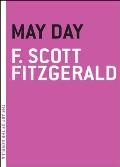Each year at this time I re-read The Great Gatsby. It has become my summer reading tradition. In this 1920 novella, I find that there are hints of Gatsby's despair in the tale of Gordon Sterrett, a solider just returned to NYC from the war. He is in debt, in some difficulties with a woman (the obvious ones), and he seeks out a fellow Yalie named Phil Dean to assist him, to no avail. He needs $300 from his affluent friend who doesn't want to ruin his affable mood by associating with the depressed and depressing Gordon.
When Phil refuses Gordon, each sees something repulsive in the other: "For an instant they quite suddenly and definitely hated each other." Phil despises Gordon's failure; Gordon hates Phil's indifference to his plight. Loss of social status and wealth literally equals death for Gordon.
There is the inevitable, Fitzgeraldian, unattainable beauty, Edith Braden, who hints at that other golden girl, Daisy Buchanan, who eludes Jay Gatsby in The Great Gatsby. Part of Gatsby's fascination with Daisy is the beauty derived from her wealth - lovely clothes, a radiance which comes from being physically pampered and loved, feminine allure, strong sexual appeal. Edith has the same aura, if that aura is somewhat subdued by a bigger conscience and a Socialist-leaning brother. However, like Daisy, when Edith sees how flawed her hero is it inspires revulsion and fear.
There is the obsession with wealth and status - this horror of poverty, of immigrants, fo the "ethnic", of the declasse. The smell, the ill fitting clothes, the poor manners ... the main characters withdraw from these elements as if stricken.
There is the "bad" girl who threatens the protagonist's existence - Myrtle, Tom Buchanan's mistress whose death literally leads to Gatsby's own demise - and Jewell, the "lower class" girl impregnated by Gordon, in this book. Yet despite this dichotomy, Ftitzgerald seems to understand the feminine psyche - like Flaubert, like Tolstoy - the sensuality of beauty and sexual attraction, the power of female beauty to attract and repel.
In May Day, Fitzgerald appears to take a more sympathetic approach to the poor and dispossessed particularly the two returning soldiers Key and Rose, whom we first meet scrounging around for booze at the beginning of the novel (after the war, establishments were prohibited from serving soldiers alcohol). They follow a parallel path to Gordon's downfall but at a lower social stratum.
| F.S.F. |
In Gatsby, the narrator's contempt for Daisy's husband Tom Buchanan, Myrtle and eventually Daisy is overt by the book's end. These are crass, selfish people who are willing to destroy the lives of others to maintain their selfish desires. Daisy and Tom survive while Gatsby, despite his flaws, perishes.
Gordon persists in believing that money is the answer but it is tainted for him, can provide no real relief to a fundamental flaw in Gordon - he is unable to flourish in the artifical society that he was raised in. When Gordon, in a fit of despair, marries Jewell, as he realizes he no longer has any options, his life literally ends.










No comments:
Post a Comment